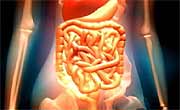Cardiovascular and pulmonary comorbidities tied to continued pain
MONDAY, April 6, 2015 (HealthDay News) — Almost half of colorectal cancer (CRC) survivors with pain interference (PI) during the initial phase of care have continued PI post-treatment, according to a study published online March 20 in Pain Medicine.
Kelly Kenzik, Ph.D., from the University of Alabama at Birmingham, and colleagues analyzed survey results from CRC participants of the Cancer Care Outcomes Research and Surveillance Consortium during the initial phase of care (baseline to under one year; 2,961 patients) and follow-up (about one year post-diagnosis; 2,303 patients).
The researchers found that at baseline and follow-up, 24.7 and 23.7 percent of participants reported moderate and high PI, respectively. PI was equivalent or increasing at follow-up among 46 percent of those with baseline PI. Female gender, comorbidities, depression, chemotherapy, and radiation were associated with moderate/high PI, both near diagnosis and at follow-up, while older age was protective of PI. Equivalent or increasing PI was associated with pulmonary disease and heart failure comorbidities. There was also a significant association between PI and no longer having a job at follow-up among survivors who were employed at baseline.
“PI may be related to continuing normal activities, that is, work, after completed treatment,” the authors write.
Copyright © 2015 HealthDay. All rights reserved.








